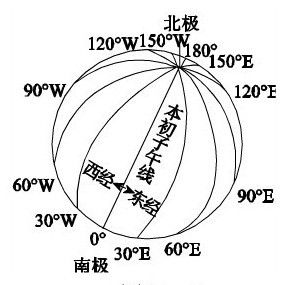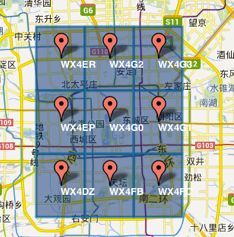geohash查找附近的人-1
查找附近的人是移动开发非常流行的功能,不但可以用于普通应用开发,也可以用于游戏开发。本人主要简单运用流行的geohash算法来简单实现查找附近的人功能,并制作一个模拟环境,使用Unity和原生安卓来实现;
目录:
1,实现查找附近的人需要掌握的前提知识;
2,geohash算法的原理,;
3,PHP与JAVA实现geohash算法;
4,unity中模拟实现查找附近的人;
内容:
第一章,实现查找附近的人需要掌握的前提知识;
1,经纬度
纬线:地球仪上的横线,lat,赤道是最大的纬线,从赤道开始分为北纬和南纬,都是0-90°,纬线是角度数值,并不是米;
经线:地球仪上的竖线,lng,子午线为0°,分为西经和东经,都是0-180°,经线也是角度数值;
经纬线和米的换算:经度或者纬度0.00001度,约等于1米,这个在GPS测算距离的时候可以体会到,GPS只要精确到小数点后五位,就是10米范围内的精度;
2,GPS
1),gps概念太复杂,主要GPS标示的是类似坐标点(XX.XXXXX,Y.XXXXX),gps保留小数5位,大概就可以精确到10米范围以内,比如成都某个地方(30.68635,103.95210)与(30.68635,103.95211)相差在10米以内;
2),测距:
抽象为球面两点距离的计算,即已知道球面上两点的经纬度;
点(纬度,经度),A($radLat1,$radLng1)、B($radLat2,$radLng2);
($radLat1、$radLng1,$radLat2,$radLng2 :弧度;$R: 为地球半径 6378137米)
通过余弦定理以及弧度计算方法,最终推导出来的算式A为:
$s = acos(cos($radLat1)*cos($radLat2)*cos($radLng1-$radLng2)+sin($radLat1)*sin($radLat2))*$R;
目前网上大多使用Google公开的距离计算公司,推导算式B为:
$s = 2*asin(sqrt(pow(sin(($radLat1-$radLat2)/2),2)+cos($radLat1)*cos($radLat2)*pow(sin(($radLng1-$radLng2)/2),2)))*$R;
算式A比算式B速度更快,本例采用算式A
PHP测距代码:
<?php
//根据经纬度计算距离 其中A($lat1,$lng1)、B($lat2,$lng2)
public static function getDistance($lat1,$lng1,$lat2,$lng2)
{
//地球半径
$R = 6378137;
//将角度转为狐度
$radLat1 = deg2rad($lat1);
$radLat2 = deg2rad($lat2);
$radLng1 = deg2rad($lng1);
$radLng2 = deg2rad($lng2);
//结果
$s = acos(cos($radLat1)*cos($radLat2)*cos($radLng1-$radLng2)+sin($radLat1)*sin($radLat2))*$R;
//精度
$s = round($s* 10000)/10000;
return round($s);
}
?>
在实际操作中,点的位置是通过数据库收索GEOHASH数据(下面提到),然后比较两个点的距离;
3,geohash算法与原理
1),geohash算法是将坐标点经度纬度转化成一个字符串,通过比较字符串相似度来判断两个坐标点的距离关系,一般前5个字符串相同,可以表示2个点在10平方千米内,前6个字符串相同大概表示在0.34平方千米,字符串相似越多,距离越近;
2),geohash算法大概原理是将地球变成一张平面图,在平面图上划分矩形区域,通过细分矩形区域来定位,具体算法可以参考
http://www.cnblogs.com/LBSer/p/3310455.html
http://www.cnblogs.com/dengxinglin/archive/2012/12/14/2817761.html
4,PHP.JAVA实现geohash
1),mongodb数据库支持geohash储存,如果不用该数据库,可以使用代码自己实现:
PHP版本:
<?php /** * Geohash generation class * http://blog.dixo.net/downloads/ * * This file copyright (C) 2008 Paul Dixon ([email protected]) * * This program is free software; you can redistribute it and/or * modify it under the terms of the GNU General Public License * as published by the Free Software Foundation; either version 3 * of the License, or (at your option) any later version. * * This program is distributed in the hope that it will be useful, * but WITHOUT ANY WARRANTY; without even the implied warranty of * MERCHANTABILITY or FITNESS FOR A PARTICULAR PURPOSE. See the * GNU General Public License for more details. * * You should have received a copy of the GNU General Public License * along with this program; if not, write to the Free Software * Foundation, Inc., 59 Temple Place - Suite 330, Boston, MA 02111-1307, USA. */ /** * Encode and decode geohashes * */ class Geohash { private $coding="0123456789bcdefghjkmnpqrstuvwxyz"; private $codingMap=array(); public function Geohash() { //build map from encoding char to 0 padded bitfield for($i=0; $i<32; $i++) { $this->codingMap[substr($this->coding,$i,1)]=str_pad(decbin($i), 5, "0", STR_PAD_LEFT); } } /** * Decode a geohash and return an array with decimal lat,long in it */ public function decode($hash) { //decode hash into binary string $binary=""; $hl=strlen($hash); for($i=0; $i<$hl; $i++) { $binary.=$this->codingMap[substr($hash,$i,1)]; } //split the binary into lat and log binary strings $bl=strlen($binary); $blat=""; $blong=""; for ($i=0; $i<$bl; $i++) { if ($i%2) $blat=$blat.substr($binary,$i,1); else $blong=$blong.substr($binary,$i,1); } //now concert to decimal $lat=$this->binDecode($blat,-90,90); $long=$this->binDecode($blong,-180,180); //figure out how precise the bit count makes this calculation $latErr=$this->calcError(strlen($blat),-90,90); $longErr=$this->calcError(strlen($blong),-180,180); //how many decimal places should we use? There's a little art to //this to ensure I get the same roundings as geohash.org $latPlaces=max(1, -round(log10($latErr))) - 1; $longPlaces=max(1, -round(log10($longErr))) - 1; //round it $lat=round($lat, $latPlaces); $long=round($long, $longPlaces); return array($lat,$long); } /** * Encode a hash from given lat and long */ public function encode($lat,$long) { //how many bits does latitude need? $plat=$this->precision($lat); $latbits=1; $err=45; while($err>$plat) { $latbits++; $err/=2; } //how many bits does longitude need? $plong=$this->precision($long); $longbits=1; $err=90; while($err>$plong) { $longbits++; $err/=2; } //bit counts need to be equal $bits=max($latbits,$longbits); //as the hash create bits in groups of 5, lets not //waste any bits - lets bulk it up to a multiple of 5 //and favour the longitude for any odd bits $longbits=$bits; $latbits=$bits; $addlong=1; while (($longbits+$latbits)%5 != 0) { $longbits+=$addlong; $latbits+=!$addlong; $addlong=!$addlong; } //encode each as binary string $blat=$this->binEncode($lat,-90,90, $latbits); $blong=$this->binEncode($long,-180,180,$longbits); //merge lat and long together $binary=""; $uselong=1; while (strlen($blat)+strlen($blong)) { if ($uselong) { $binary=$binary.substr($blong,0,1); $blong=substr($blong,1); } else { $binary=$binary.substr($blat,0,1); $blat=substr($blat,1); } $uselong=!$uselong; } //convert binary string to hash $hash=""; for ($i=0; $i<strlen($binary); $i+=5) { $n=bindec(substr($binary,$i,5)); $hash=$hash.$this->coding[$n]; } return $hash; } /** * What's the maximum error for $bits bits covering a range $min to $max */ private function calcError($bits,$min,$max) { $err=($max-$min)/2; while ($bits--) $err/=2; return $err; } /* * returns precision of number * precision of 42 is 0.5 * precision of 42.4 is 0.05 * precision of 42.41 is 0.005 etc */ private function precision($number) { $precision=0; $pt=strpos($number,'.'); if ($pt!==false) { $precision=-(strlen($number)-$pt-1); } return pow(10,$precision)/2; } /** * create binary encoding of number as detailed in http://en.wikipedia.org/wiki/Geohash#Example * removing the tail recursion is left an exercise for the reader */ private function binEncode($number, $min, $max, $bitcount) { if ($bitcount==0) return ""; #echo "$bitcount: $min $max<br>"; //this is our mid point - we will produce a bit to say //whether $number is above or below this mid point $mid=($min+$max)/2; if ($number>$mid) return "1".$this->binEncode($number, $mid, $max,$bitcount-1); else return "0".$this->binEncode($number, $min, $mid,$bitcount-1); } /** * decodes binary encoding of number as detailed in http://en.wikipedia.org/wiki/Geohash#Example * removing the tail recursion is left an exercise for the reader */ private function binDecode($binary, $min, $max) { $mid=($min+$max)/2; if (strlen($binary)==0) return $mid; $bit=substr($binary,0,1); $binary=substr($binary,1); if ($bit==1) return $this->binDecode($binary, $mid, $max); else return $this->binDecode($binary, $min, $mid); } } ?>
JAVA版本:
import java.io.File;
import java.io.FileInputStream;
import java.util.BitSet;
import java.util.HashMap;
public class Geohash {
private static int numbits = 6 * 5;
final static char[] digits = { '0', '1', '2', '3', '4', '5', '6', '7', '8',
'9', 'b', 'c', 'd', 'e', 'f', 'g', 'h', 'j', 'k', 'm', 'n', 'p',
'q', 'r', 's', 't', 'u', 'v', 'w', 'x', 'y', 'z' };
final static HashMap<Character, Integer> lookup = new HashMap<Character, Integer>();
static {
int i = 0;
for (char c : digits)
lookup.put(c, i++);
}
public static void main(String[] args) throws Exception{
System.out.println(new Geohash().encode(45, 125));
}
public double[] decode(String geohash) {
StringBuilder buffer = new StringBuilder();
for (char c : geohash.toCharArray()) {
int i = lookup.get(c) + 32;
buffer.append( Integer.toString(i, 2).substring(1) );
}
BitSet lonset = new BitSet();
BitSet latset = new BitSet();
//even bits
int j =0;
for (int i=0; i< numbits*2;i+=2) {
boolean isSet = false;
if ( i < buffer.length() )
isSet = buffer.charAt(i) == '1';
lonset.set(j++, isSet);
}
//odd bits
j=0;
for (int i=1; i< numbits*2;i+=2) {
boolean isSet = false;
if ( i < buffer.length() )
isSet = buffer.charAt(i) == '1';
latset.set(j++, isSet);
}
double lon = decode(lonset, -180, 180);
double lat = decode(latset, -90, 90);
return new double[] {lat, lon};
}
private double decode(BitSet bs, double floor, double ceiling) {
double mid = 0;
for (int i=0; i<bs.length(); i++) {
mid = (floor + ceiling) / 2;
if (bs.get(i))
floor = mid;
else
ceiling = mid;
}
return mid;
}
public String encode(double lat, double lon) {
BitSet latbits = getBits(lat, -90, 90);
BitSet lonbits = getBits(lon, -180, 180);
StringBuilder buffer = new StringBuilder();
for (int i = 0; i < numbits; i++) {
buffer.append( (lonbits.get(i))?'1':'0');
buffer.append( (latbits.get(i))?'1':'0');
}
return base32(Long.parseLong(buffer.toString(), 2));
}
private BitSet getBits(double lat, double floor, double ceiling) {
BitSet buffer = new BitSet(numbits);
for (int i = 0; i < numbits; i++) {
double mid = (floor + ceiling) / 2;
if (lat >= mid) {
buffer.set(i);
floor = mid;
} else {
ceiling = mid;
}
}
return buffer;
}
public static String base32(long i) {
char[] buf = new char[65];
int charPos = 64;
boolean negative = (i < 0);
if (!negative)
i = -i;
while (i <= -32) {
buf[charPos--] = digits[(int) (-(i % 32))];
i /= 32;
}
buf[charPos] = digits[(int) (-i)];
if (negative)
buf[--charPos] = '-';
return new String(buf, charPos, (65 - charPos));
}
}
C#版本:
C#版本的geohash代
using System;
namespace sharonjl.utils
{
public static class Geohash
{
#region Direction enum
public enum Direction
{
Top = 0,
Right = 1,
Bottom = 2,
Left = 3
}
#endregion
private const string Base32 = "0123456789bcdefghjkmnpqrstuvwxyz";
private static readonly int[] Bits = new[] {16, 8, 4, 2, 1};
private static readonly string[][] Neighbors = {
new[]
{
"p0r21436x8zb9dcf5h7kjnmqesgutwvy", // Top
"bc01fg45238967deuvhjyznpkmstqrwx", // Right
"14365h7k9dcfesgujnmqp0r2twvyx8zb", // Bottom
"238967debc01fg45kmstqrwxuvhjyznp", // Left
}, new[]
{
"bc01fg45238967deuvhjyznpkmstqrwx", // Top
"p0r21436x8zb9dcf5h7kjnmqesgutwvy", // Right
"238967debc01fg45kmstqrwxuvhjyznp", // Bottom
"14365h7k9dcfesgujnmqp0r2twvyx8zb", // Left
}
};
private static readonly string[][] Borders = {
new[] {"prxz", "bcfguvyz", "028b", "0145hjnp"},
new[] {"bcfguvyz", "prxz", "0145hjnp", "028b"}
};
public static String CalculateAdjacent(String hash, Direction direction)
{
hash = hash.ToLower();
char lastChr = hash[hash.Length - 1];
int type = hash.Length%2;
var dir = (int) direction;
string nHash = hash.Substring(0, hash.Length - 1);
if (Borders[type][dir].IndexOf(lastChr) != -1)
{
nHash = CalculateAdjacent(nHash, (Direction) dir);
}
return nHash + Base32[Neighbors[type][dir].IndexOf(lastChr)];
}
public static void RefineInterval(ref double[] interval, int cd, int mask)
{
if ((cd & mask) != 0)
{
interval[0] = (interval[0] + interval[1])/2;
}
else
{
interval[1] = (interval[0] + interval[1])/2;
}
}
public static double[] Decode(String geohash)
{
bool even = true;
double[] lat = {-90.0, 90.0};
double[] lon = {-180.0, 180.0};
foreach (char c in geohash)
{
int cd = Base32.IndexOf(c);
for (int j = 0; j < 5; j++)
{
int mask = Bits[j];
if (even)
{
RefineInterval(ref lon, cd, mask);
}
else
{
RefineInterval(ref lat, cd, mask);
}
even = !even;
}
}
return new[] {(lat[0] + lat[1])/2, (lon[0] + lon[1])/2};
}
public static String Encode(double latitude, double longitude, int precision = 12)
{
bool even = true;
int bit = 0;
int ch = 0;
string geohash = "";
double[] lat = {-90.0, 90.0};
double[] lon = {-180.0, 180.0};
if (precision < 1 || precision > 20) precision = 12;
while (geohash.Length < precision)
{
double mid;
if (even)
{
mid = (lon[0] + lon[1])/2;
if (longitude > mid)
{
ch |= Bits[bit];
lon[0] = mid;
}
else
lon[1] = mid;
}
else
{
mid = (lat[0] + lat[1])/2;
if (latitude > mid)
{
ch |= Bits[bit];
lat[0] = mid;
}
else
lat[1] = mid;
}
even = !even;
if (bit < 4)
bit++;
else
{
geohash += Base32[ch];
bit = 0;
ch = 0;
}
}
return geohash;
}
}
}
C#代码来自:https://github.com/sharonjl/geohash-net
其他版本可以参考:
http://www.cnblogs.com/dengxinglin/archive/2012/12/14/2817761.html 邓星林-GEOHASH算法原理和实现
2),测试(下一篇)



